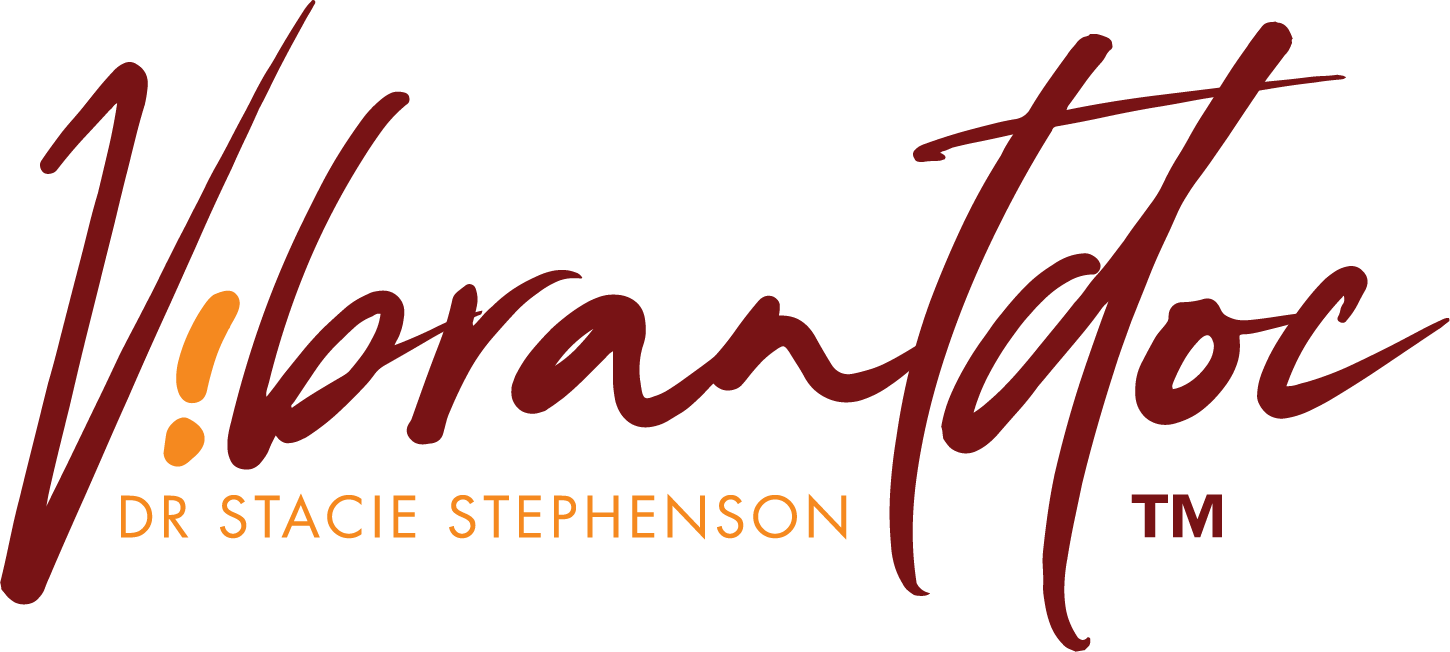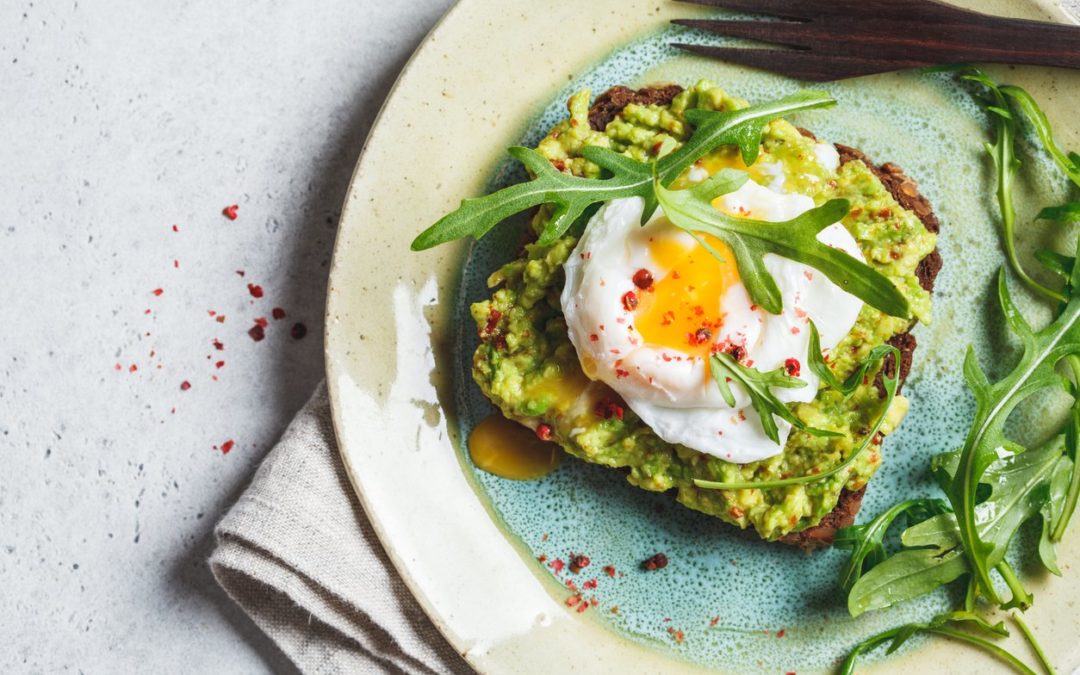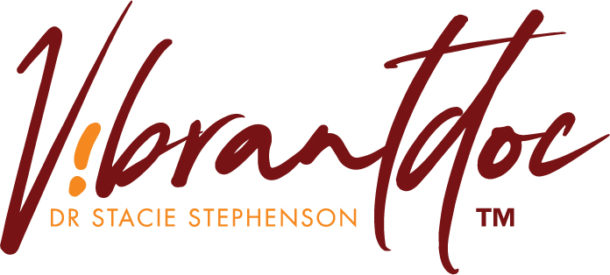(All images sourced from Parade)
By Kaitlin Vogel / May 14, 2021
While there are a wide variety of anxiety management tools out there—yoga, therapy, meditation, and journaling, to name a few–one of the most simple yet powerful ways to combat your anxiety is through your diet.
Food has the power to energize and give us strength, yet many people don’t take full advantage of it. It’s the fuel we need to function, so it’s important to be mindful of what we put into our bodies.
If you’ve been feeling anxious, start with giving your diet a tune-up. Here are 14 foods recommended by mental health experts to calm your mind.
Foods for Anxiety
Pumpkin Seeds (Pepitas)
Pumpkin seeds can be a food to help reduce anxiety because they are a good source of magnesium and zinc, Holly Klamer, MS, RDN, explains. Low magnesium has a role in managing anxiety and regulating mood, so eating foods high in magnesium could help reduce anxiety. Zinc has been shown to play a role with lowering anxiety. An ounce of pumpkin seeds provides 18% daily value (DV) magnesium and 20% DV zinc.
Eggs
Eggs contain tryptophan, an amino acid that helps create serotonin. Serotonin is a chemical neurotransmitter that helps to regulate sleep, mood, memory and behavior, says Dr. Holly Schiff, PsyD, Licensed Clinical Psychologist. Serotonin also helps improve brain function and relieve anxiety. Anxiety is considered to be caused by low serotonin levels. Egg yolks are a good source of vitamin D, which can boost your mood and counter some of the negative effects that lead to anxiety.
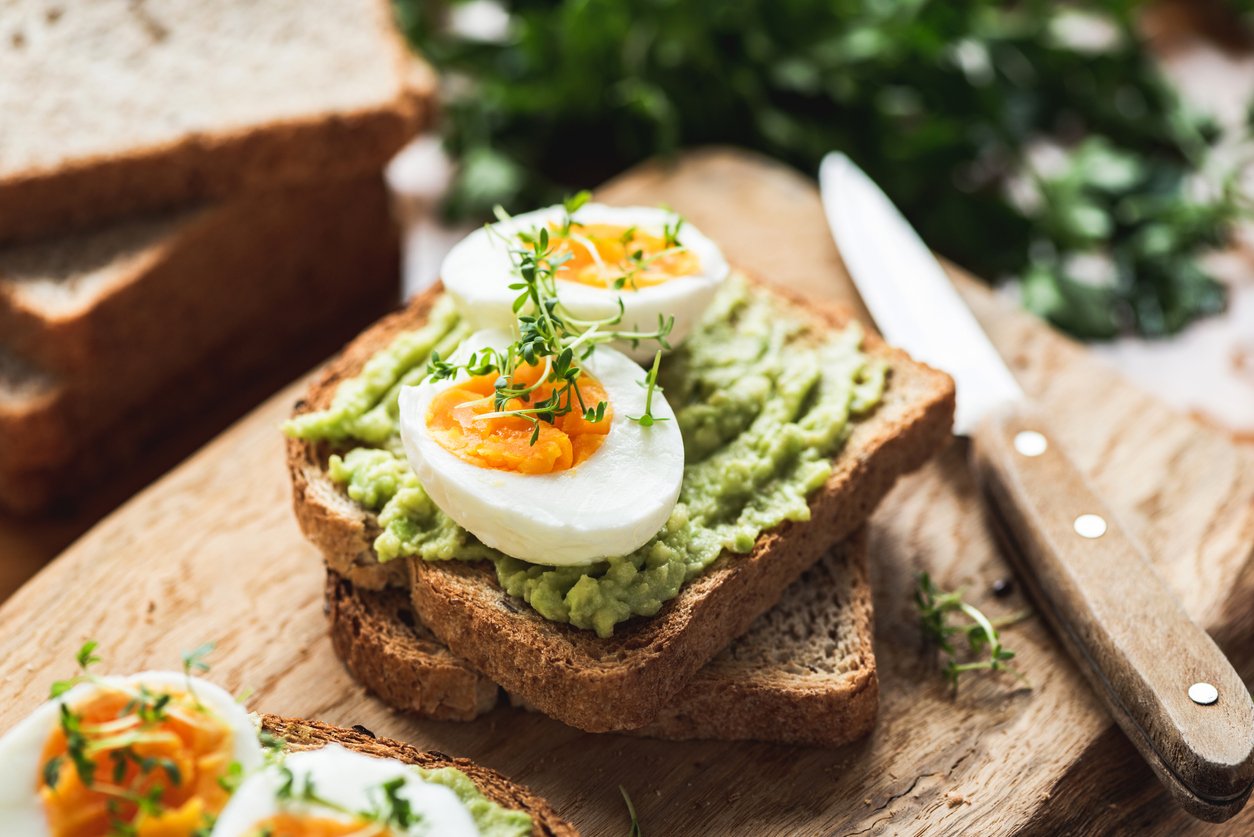
Legumes
Lentils, beans, and peas are classified as lentils and this group of foods is not only a good source of plant-based protein, but also a good source of magnesium, aka the “calming mineral,” Maggie Michalczyk, Registered Dietician Nutritionist, states.
Magnesium is very important for many functions in the body including muscle relaxation, and lowering blood pressure – both important for helping to prevent and reduce feelings of anxiety. It’s even known to help with sleep, so adding these foods into your dinner might just help you relax and feel less anxious before bedtime.
Dark Chocolate
Research has shown compounds called flavanols in dark chocolate can have a positive effect on mood and may help promote the growth of new neurons in the brain. Besides flavanols, dark chocolate also provides a source of magnesium, Klamer says. Dark chocolate, as opposed to milk or white chocolate, has higher levels of flavanols and has less sugar. Portion size should be around an ounce per day.
Dr. Schiff also recommends dark chocolate. “Chocolate, especially pure dark chocolate, reduces cortisol, the stress hormone that causes anxiety symptoms. Dark chocolate also has antioxidants, called flavonoids, which are responsible for reducing neuroinflammation and cell death in the brain, which results in improved brain function and protects your cells,” Dr. Schiff explains. “Dark chocolate also increases serotonin in the brain, boosting mood. Dark chocolate is high in magnesium and sufficient amounts of magnesium can reduce symptoms of a mood disorder, like anxiety.”
Walnuts
The anti-inflammatory omega-3 fatty acids in walnuts that provide this benefit, says Dr. Tricia Pingel, NMD, an Arizona-based naturopathic physician. According to a 2018 meta-analysis, consuming omega-3 fatty acids significantly helped to reduce the symptoms of clinical anxiety.
And a 2016 study on male college student found that those who regularly consumed walnuts reported about a 28% improvement in mood.
Plain Greek Yogurt
Yogurt is a food for reducing anxiety because it is a source of zinc and probiotics. Probiotics are considered healthy gut bacteria that may play a role in brain function, handling stress along with promoting gut health, Klamer explains. Plain yogurt is lower in sugar and can be sweetened with honey, fruit or jam.
Almonds
Almonds contain a large amount of vitamin E, which prevents anxiety disorders. Almonds also contain zinc, which is a key nutrient in maintaining a balanced mood, Dr. Schiff states. Almonds also have iron, which is important since low iron levels are known to cause brain fatigue, which can contribute to anxiety.
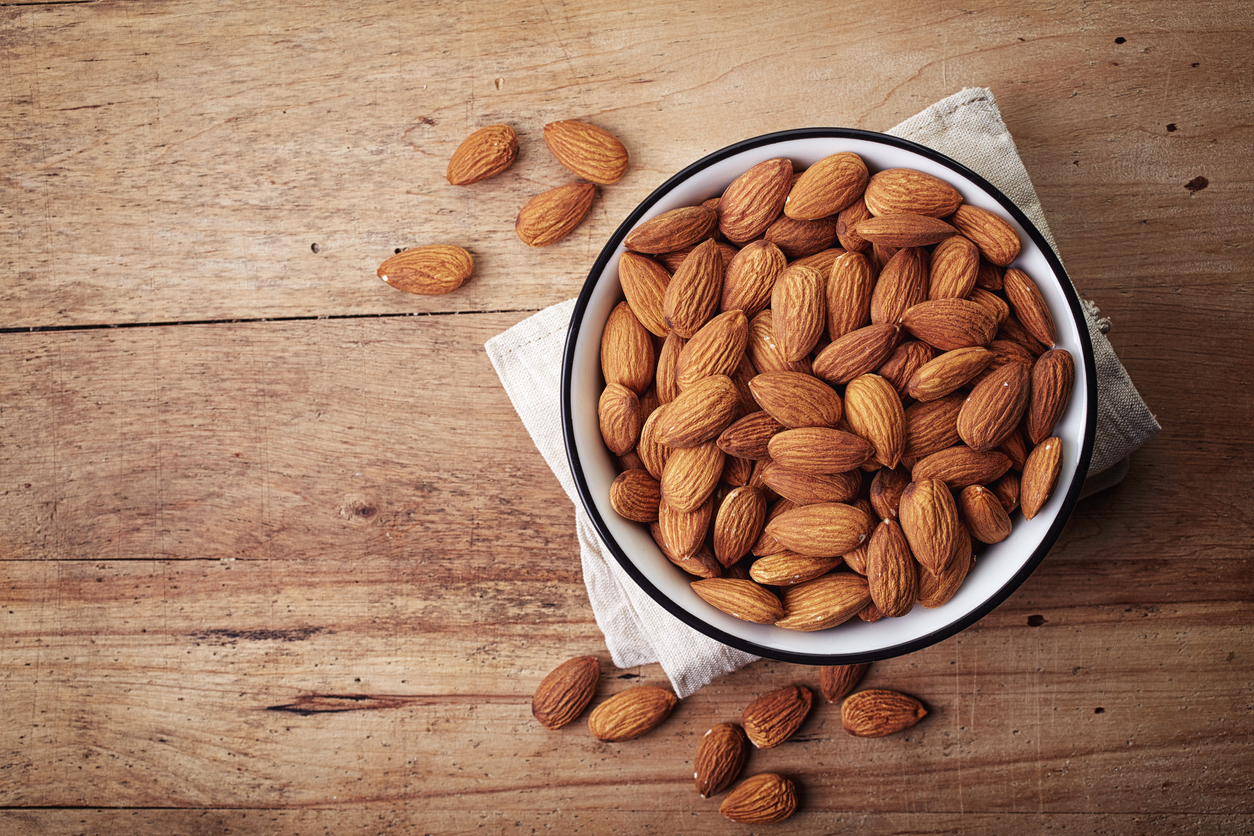 Turmeric and Ginger
Turmeric and Ginger
Turmeric contains curcumin which has anti-inflammatory and antioxidant compounds that may reduce anxiety, Dr. Catherine Jackson, licensed psychologist and certified neurotherapist at Optimal Neuroholistic Services, explains. While ginger on the other hand helps boost brain health, it has antioxidants that reduces inflammation and protects the brain against damage to the brain caused by oxidative stress.
Fish Rich In Omega-3 Fatty Acids
These include sardines, salmon or tuna. These acids help with depression and anxiety because they ease inflammation, and have a strong relationship with cognitive function and mental health, says Dr. Schiff. Omega-3 fatty acids also regulate neurotransmitters, so when you are feeling tense or stressed, they help keep cortisol and adrenaline from spiking; thereby reducing anxiety.
Tea
Relaxing teas, specifically green tea, chamomile and moringa have been found to be beneficial in reducing stress and decreasing anxiety while also boosting energy. Their antioxidant content, which reduces free radicals, and their inflammation reducing properties also make them ideal for consumption to reduce anxiety, Dr. Jackson states. Furthermore, green tea has L-theanine and other antioxidant properties that increase GABA, dopamine and serotonin in the brain, reduce inflammation and the impact of anxiety.
Green tea often as a replacement for coffee, as it is a dietary source of L-theanine, Taylor Osbaldeston, Registered Holistic Nutritionist, explains. L-theanine is an amino acid that promotes relaxation without decreasing alertness. So, it is helpful when you need support reducing the effects of stress and anxiety but still need to be productive.
Dr. Carrie Lam, MD, FAAMFM, ABAARM, recommends chamomile tea. “This is an herbal home remedy that has been used for centuries due to its calming effect,” Dr. Lam says. “Studies suggest chamomile tea to be effective in reducing anxiety. Two to three cups of this tea may be needed to achieve the benefits.”
Avocados
Avocados are a great natural source of both folate and B vitamins, which are known to help relieve stress and anxiety, Dr. Pingel states.
According to a 2010 study on 215 healthy men, B vitamins significantly helped decrease their stress levels. Meanwhile, a 2012 study showed that folate deficiencies may contribute to anxiety and irrational fears.
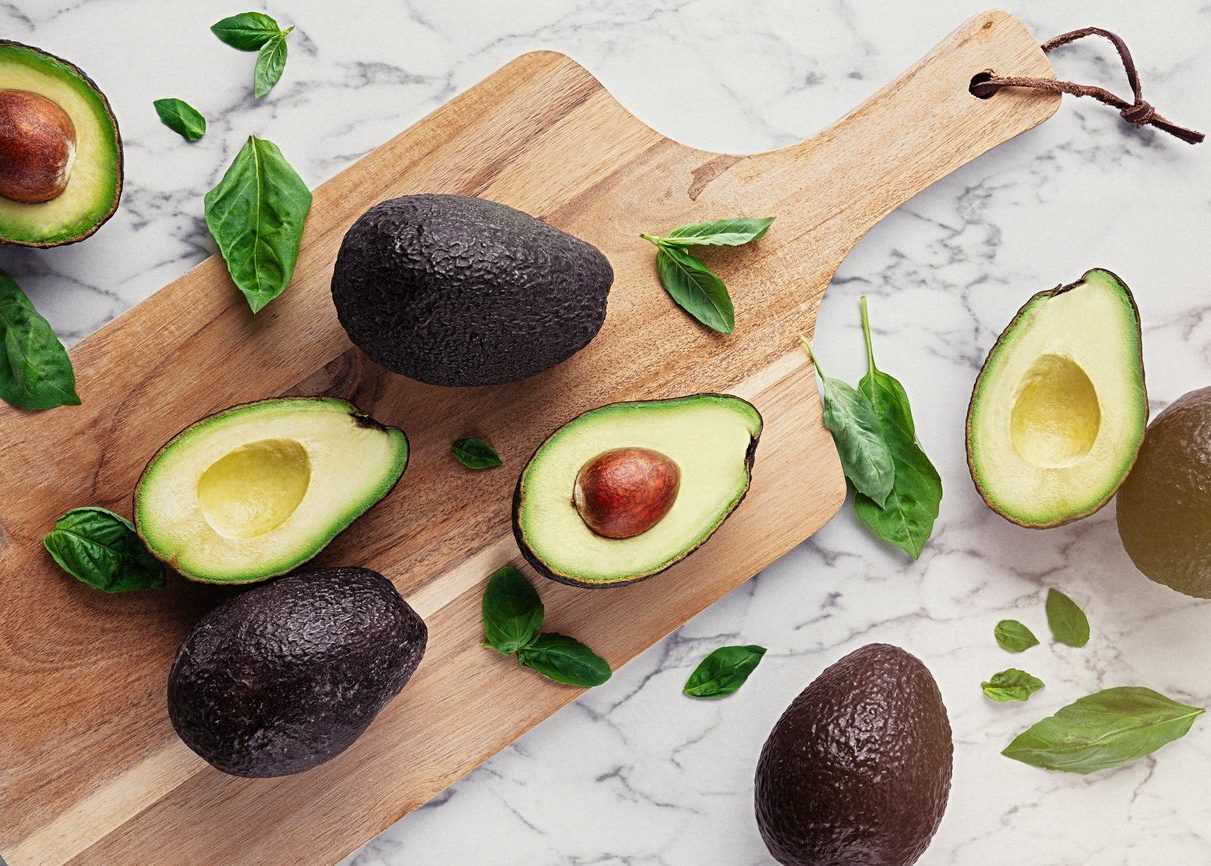
Fermented Foods
Because 95% of your serotonin production (the “happy” hormone) takes place in your gut, any imbalances in your gut microbiota can result in anxiety, Dr. Pingel explains.
Fermented foods such as kimchi, sauerkraut, tempeh, and miso are great sources of probiotics, which have been shown to fight symptoms of both anxiety and depression. A 2019 review of seven studies found that in all of the studies probiotics significantly improved anxiety and/or depression in subjects.
Leafy Greens
The best are spinach, romaine, chard, and collards, which are rich in many of the B vitamins, says Dr. Stacie Stephenson, Certified Nutrition Specialist, CEO of Vibrant Doc and author of Vibrant: A Groundbreaking Program to Get Energized, Own Your Health and Glow.
Research shows leafy greens are proven mood boosters, especially in people with B vitamin deficiencies. They are also good sources of magnesium—we know magnesium deficiency can induce anxiety and dysregulation of the hypothalamic-pituitary adrenal (HPA) axis, which among other things helps to regulate mood and serotonin production, so it makes sense that replenishing magnesium could help resolve anxiety, Dr. Stephenson adds.
On top of all that, dark leafy greens contain antioxidants like vitamin C and beta-carotene, which contribute to healthy brain function. Standouts are spinach (raw or cooked), romaine lettuce, kale, collard greens, chard, and arugula.
Oysters and Clams
Oysters and clams are not only B-vitamin rich—they have especially high levels of nervous-system-regulating B12—but they are both rich sources of zinc, which is a proven mood booster. Dr. Stephenson explains.
Research has shown that low levels of zinc are associated with anxiety, possibly because they cause reduced levels of GABA and glutamate, which could trigger anxiety, while supplementing with zinc raised GABA levels and improved anxiety, says Dr. Stephenson. On top of that, they both contain tryptophan, which is a precursor to 5HTP, which is a precursor to serotonin, so it’s especially important for stabilizing mood and helping to calm anxiety.
One study showed that those consuming food high in tryptophan had significantly lower anxiety scores than those consuming low tryptophan.
Bonus tip: Top three foods to avoid
As important as it is to know what to eat, it’s equally important to know what foods to avoid. Dr. Jackson lists the top three:
Alcohol
While it’s consumed to ease one’s nerves it often has negative effects, such as dehydration, sleep difficulties and lower serotonin in the brain, that exacerbate anxiety symptoms.
Caffeine
High levels of caffeine can increase nervousness and anxiety and decrease the neurotransmitter, serotonin.
Sugar
While sugar cannot be completely avoided and while sugar found naturally in fruits and vegetables is fine in moderation, added sugar is problematic for anxiety symptoms. The spike that comes with added sugar in foods leads to a hard crash later and an increase in worry and irritability.
